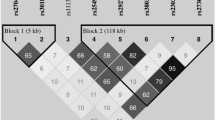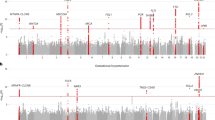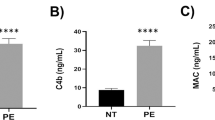Abstract
Allelic variations affecting the activity of the maternal renin-angiotensin system may play a role in the development of hypertensive disorders of pregnancy like preeclampsia, its more severe early-onset form, and intrauterine growth restriction. We examined the association of common allelic variants of angiotensin II type 1 and type 2 receptor genes (AT1R and AT2R) sorted in five AT1R/AT2R receptor combination genotype groups with susceptibility to early-onset preeclampsia (EOP). The occurrence of AT1R (A1166C) and A2TR (C3123A) alleles in wild type (AA, CC), heterozygous (A/C, C/A), and homozygous (C/C, A/A) states was recorded in 84 women with a history of EOP and 84 age-matched controls sorted in five AT1R/AT2R receptor combination genotype (wild type: AA/CC, one mutant: AA/CA, AC/CC, two mutant: AC/CA, AA/AA, CC/CC, three mutants: AC/AA, CC/CA and four mutant: CC/AA) groups, by polymerase chain reaction-RFLP analysis. Three mutant receptor combination genotype carriers were more common in women with a history of EOP than in controls (26.18% vs. 4.76%, p = 0.003, OR = 8.25). Receptor combination genotyping may be of clinical value in: (a) maternal prediction of susceptibility to EOP, (b) disease subtyping for directed studies with receptor signaling antagonists, (c) the broader study of hypertension.
This is a preview of subscription content, access via your institution
Access options
Subscribe to this journal
Receive 12 digital issues and online access to articles
$119.00 per year
only $9.92 per issue
Buy this article
- Purchase on Springer Link
- Instant access to full article PDF
Prices may be subject to local taxes which are calculated during checkout

Similar content being viewed by others
References
Myatt L, Roberts JM. Preeclampsia: syndrome or disease? Curr Hypertens Rep. 2015;17:83.
Roberts JM. The perplexing pregnancy disorder preeclampsia: what next? Physiol Genom. 2018;50:459–67.
Tranquilli AL, Dekker G, Magee L, Roberts J, Sibai BM, Steyn W, et al. The classification, diagnosis and management of the hypertensive disorders of pregnancy: a revised statement from the ISSHP. Pregnancy Hypertens. 2014;4:97–104.
Shih T, Peneva D, Xu X, Sutton A, Triche E, Ehrenkranz RA, et al. The rising burden of preeclampsia in the United States impacts both maternal and child health. Am J Perinatol. 2016;33:329–38.
Williams PJ, Pipkin FB. The genetics of pre-eclampsia and other hypertensive disorders of pregnancy. Best Pract Res Clin Obstet Gynaecol. 2011;25:405–17.
Mistry HD, Kurlak LO, Pipkin FB. The placental renin-angiotensin system and oxidative stress in pre-eclampsia. Placenta. 2013;34:182–6.
Mistry HD, Williams PJ. The importance of antioxidant micronutrients in pregnancy. Oxid Med Cell Longev. 2011;2011:841749.
Cain MA, Salemi JL, Tanner JP, Kirby RS, Salihu HM, Louis JM. Pregnancy as a window to future health: maternal placental syndromes and short-term cardiovascular outcomes. Am J Obstet Gynecol. 2016;215:484.
Redman CW, Staff AC. Preeclampsia, biomarkers, syncytiotrophoblast stress, and placental capacity. Am J Obstet Gynecol. 2015;213:S9.e1.
van Rijn BB, Franx A, Steegers EA, de Groot CJ, Bertina RM, Pasterkamp G, et al. Maternal TLR4 and NOD2 gene variants, proinflammatory phenotype and susceptibility to early-onset preeclampsia and HELLP syndrome. PLoS ONE. 2008;3:e1865.
Xie F, Hu Y, Speert DP, Turvey SE, Peng G, Money DM, et al. Toll-like receptor gene polymorphisms and preeclampsia risk: a case control study and data synthesis. Hypertens Pregnancy. 2010;29:390–8.
Ohkuchi A, Hirashima C, Matsubara S, Suzuki H, Takahashi K, Arai F, et al. Alterations in placental growth factor levels before and after the onset of preeclampsia are more pronounced in women with early onset severe preeclampsia. Hypertens Res. 2007;30:151–9.
Yang J, Shang J, Zhang S, Li H, Liu H. The role of the renin-angiotensin-aldosterone system in preeclampsia: genetic polymorphisms and microRNA. J Mol Endocrinol. 2013;50:R53–R66.
Dahabiyeh LA, Tooth D, Kurlak LO, Mistry HD, Pipkin FB, Barrett DA. A pilot study of alterations in oxidized angiotensinogen and antioxidants in pre-eclamptic pregnancy. Sci Rep. 2020;10:1–8.
Williams PJ, Mistry HD, Innes BA, Bulmer JN, Pipkin FB. Expression of AT1R, AT2R and AT4R and their roles in extravillous trophoblast invasion in the human. Placenta. 2010;31:448–55.
Procopciuca LM, Nemetib G, Buzduganc E, Iancud M, Stamatianb F, Caracosteab G. Renin-angiotensin system gene variants and risk of early- and late-onset preeclampsia: a single center case-control study. Pregnancy Hypertens. 2019;18:1–8.
Zhou A, Dekker GA, Lumbers ER, Lee SY, Thompson SD, McCowan LME et al. Αssociation of AGT2R polymorphisms with preeclampsia and uterine artery bilateral notching is modulated by maternal BMI. Placenta 2013;34:75–81.
Zhang L, Yang H, Qin H, Zhang K. Angiotensin II type I receptor A1166C polymorphism increases the risk of pregnancy hypertensive disorders: evidence from a meta-analysis. J Renin Angiotensin Aldosterone Syst. 2014;15:131–8.
Soltani-Zangbar MS, Pahlavani B, Zolghadri J, Gharesi-Fard B. Angiotensin type 2 receptor gene polymorphisms and susceptibility to preeclampsia. J Reprod Infertil 2018;19:95–99.
Aung M, Konoshita T, Moodley J, Gathiram P. Association of gene polymorphisms of four components of renin-angiotensin-aldosterone system and preeclampsia in South African black women. Eur J Obstet Gynecol Reprod Biol. 2017;215:180–7.
Li Y, Zhu M, Hu R, Yan W. The effects of gene polymorphisms in angiotensin II receptors on pregnancy-induced hypertension and preeclampsia: a systematic review and meta-analysis. Hypertens Pregnancy. 2015;34:241–60.
Vamvakopoulou DN, Satra M, Fegga A, Kourti M, Sidiropoulos A, Daponte A, et al. Association of maternal Toll-like receptor-4 alleles with susceptibility to early-onset preeclampsia in central Greece. Pregnancy Hypertens. 2019;18:103–7.
Ueki N, Takeda S, Koya D, Kanasaki K. The relevance of the Renin-Angiotensin system in the development of drugs to combat preeclampsia. Int J Endocrinol. 2015;2015:572713.
Cunningham MW Jr, Williams JM, Amaral L, Usry N, Wallukat G, Dechend R, et al. Agonistic autoantibodies to the angiotensin II type 1 receptor enhance angiotensin II-induced renal vascular sensitivity and reduce renal function during pregnancy. Hypertension 2016;68:1308–13.
Chow BS, Allen TJ. Angiotensin II type 2 receptor (AT2R) in renal and cardiovascular disease. Clin Sci. 2016;130:1307–26.
Forrester SJ, Booz GW, Sigmund CD, Coffman TM, Kawai T, Rizzo V, et al. Angiotensin II signal transduction: an update on mechanisms of physiology and pathophysiology. Physiol Rev 2018;98:1627–738.
Wallukat G, Homuth V, Fischer T, Lindschau C, Horstkamp B, Jόpner A, et al. Patients with preeclampsia develop agonistic autoantibodies against the angiotensin AT1 receptor. J Clin Investig 1999;103:945–52.
Saxena AR, Karumanchi SA, Brown NJ, Royle CM, McElrath TF, Seely EW. Increased sensitivity to angiotensin II is present postpartum in women with a history of hypertensive pregnancy. Hypertension. 2010;55:1239–45.
Stanhewicz AE, Jandu S, Santhanam L, Alexander LM. Increased angiotensin II sensitivity contributes to microvascular dysfunction in women who have had preeclampsia. Hypertension 2017;70:382–9.
Sakairi A, Ishida J, Honjo K, Inaba S, Nakamura S, Sugiyama F, et al. Angiotensin type 1 receptor blockade prevents cardiac remodeling in mice with pregnancy associated hypertension. Hypertens Res. 2008;31:2165–75.
Ahmed R, Dunford J, Mehran R, Robson S, Kunadian V. Pre-eclampsia and future cardiovascular risk among women: a review. J Am Coll Cardiol 2014;63:1815–22.
Ghossein-Doha C, van Neer J, Wissink B, Breetveld NM, de Windt LJ, van Dijk AP, et al. Pre-eclampsia: an important risk factor for asymptomatic heart failure. Ultrasound Obstet Gynecol 2017;49:143–9.
Arnadottir GA, Geirsson RT, Arngrimsson R, Jonsdottir LS, Olafsson O. Cardiovascular death in women who had hypertension in pregnancy: a case-control study. BJOG 2005;112:286–92.
Alvarez-Alvarez B, Martell-Claros N, Abad-Cardiel M, Garcνa-Donaire JA. Hypertensive disorders during pregnancy: cardiovascular long term outcomes. Hipertens Riesgo Vasc 2017;34:85–92.
Author information
Authors and Affiliations
Corresponding author
Ethics declarations
Informed consent
Signed informed consent was obtained from all study participants.
Conflict of interest
The authors declare no competing interests.
Additional information
Publisher’s note Springer Nature remains neutral with regard to jurisdictional claims in published maps and institutional affiliations.
Rights and permissions
About this article
Cite this article
Satra, M., Samara, M., Alatsathianos, G. et al. Association of maternal angiotensin II type 1 and type 2 receptor combination genotypes with susceptibility to early-onset preeclampsia. J Hum Hypertens 36, 271–279 (2022). https://doi.org/10.1038/s41371-021-00524-5
Received:
Revised:
Accepted:
Published:
Issue Date:
DOI: https://doi.org/10.1038/s41371-021-00524-5



